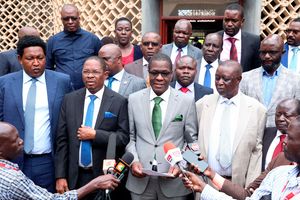MPs urge caution in having zero-fault audit reports as a measure of performance

The Public Accounts Committee Chairperson John Mbadi.
A parliamentary committee has raised a red flag over a directive by Head of Public Service Felix Koskei requiring all accounting officers to get zero audit queries as a measure of performance.
The Public Accounts Committee (PAC) of the National Assembly faulted the directive noting that while pushing for the clean audits, also known as zero fault audits, is okay, it could serve to compromise the auditors.
Instead, PAC Chairperson John Mbadi advised Mr Koskei to direct all the accounting officers to implement the recommendations of the committee’s reports on the audited accounts of the national government.
Although he admitted that the clean audits would ease the committee’s work, he said the directive could compromise their oversight role.
“What Mr Koskei is pushing for will open the floodgates for those involved to procure clean audit reports, potentially reducing the office of the Auditor-General to a toll station. It will open the window for the auditors to bid more. That is my worry,” said Mr Mbadi.
PAC is in charge of reviewing the reports of the Auditor-General on the accounts of the national government’s ministries, departments and agencies.
At a consultative meeting with all principal secretaries and chief executive officers of State corporations on September 21 on the implementation of the “zero fault audit regime” for the 2023/24 financial year, Mr Koskei urged the officials to ensure they comply as a performance metric.
“This initiative is designed to reinforce good governance, integrity, accountability, transparency and the establishment of global best practices within Kenya’s government institutions,” read the resolutions of the meeting. The meeting also noted that the initiative holds the potential to yield substantial savings in legal expenses.
Mr Koskei urged auditors to support the initiative, which he said aims to streamline internal audit systems in government.
Reports of the Auditor-General tabled in Parliament have regularly raised issues with the blatant misuse of public resources. Some of the audit queries raised include failure to prove expenditures, violation of procurement laws and lack of well-prepared financial statements. Some of these issues have recurred for years.
Even as Mr Koskei made the push, Auditor-General Nancy Gathungu told PAC that her office was under pressure to issue the zero-fault audits in the name of clearance certificates starting with the 2023/24 financial year.
“There is nothing in the auditing standards that requires the office of the Auditor-General to issue clearance certificates on audit reports. That is the work of parliament,” said Ms Gathungu. “What they need to do is to spend the public funds within the law, prepare the financial statements well and you will not have audit queries. Those are the standards. I will issue audit opinions based on the financial statements submitted to us.”
She said that her office is inundated with “documents that were needed long ago” for audit queries that Parliament has considered by way of reports that have already been adopted.
“Once they submit the documents, they claim the matters have been resolved. But you cannot clear this at the entry level,” she said. The Auditor-General told the committee that her desire to stick to the law and the auditing standards has seen government accounting officers “become mad with me and calling me asking why I have continued to release bad reports against them”.
Asked if she is worried about herself and her staff in the wake of Mr Koskei’s directive, she said: “I have told my staff to be extremely careful and report any instances of threats.”
The Public Finance Management Act of 2012 provides that all accounting officers shall be required to prepare and submit financial statements to the Auditor-General within three months of the end of every financial year. The auditor-general shall then, within three months, audit and report to Parliament or county assemblies on the expenditures.
Within three months of receiving an audit report, Parliament or the county assembly shall debate and consider the report and take appropriate action.





